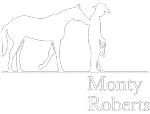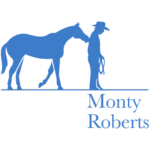Please can you help me? I have the most amazing pony for the show ring but I have a huge problem with her she will not stand in the lineup in the ring. When they are called in to the center she just will not stand and then will rear continuously and just gets so worried. Please can you help me? She is unbeaten when she stands but this is very rare. She also hates clapping it gets her so upset and makes the whole situation worse! I would love some of you advice.
Monty’s Answer:
Thank you for giving me the opportunity to once again address the issue that you describe in your question. It is a fact that a question similar to yours comes up globally about a hundred to 200 times per year. It is probably second only to “my horse or pony won’t load”. Your question is word-for-word virtually identical to the one asked of me by Simon Charlesworth who trains in the area of Newmarket in England.
Simon was training a pony of the highest caliber seen in the entire UK in the year 2012. Simon was forced to retire Pearly King from classes due to the very behavior that you have described in your question. When he stood and, for whatever reason, was relaxed and controllable on the day, he was an undefeated winner of ridden pony classes. I was asked to travel to Newmarket and deal with Pearly King for one day.
As it turns out Simon Charlesworth is the best student anyone could hope for. He must have listened to every word I said, logged it in an organized brain and then put it to work in a flawless manner. Pearly King responded beautifully and was undefeated subsequent to the work we did. Pearly King qualified for the Horse of the Year Show, was the champion ridden pony and went on to be the “supreme champion ridden horse of the UK 2012”.
So the question is “what the heck did we do?” Well, I can tell you that every student of my Equus Online University has been made fully aware of the principles I used with Pearly King. First and foremost were the lessons on the use of the Dually Halter. After that there were the principles of standing to mount. Then there was standing while mounted. I realize that it is not helpful to simply be exposed to these lessons — the challenge is learning how to execute them.
Simon Charlesworth not only listened but he must have worked very hard at implementing these lessons. Simon went on to use the recommended electronic sounds of applause and other frightening auditory experiences. He must have had them going for hours on end in Pearly King’s stable. When he entered competition Pearly King was able to stand with his tail toward the audience while they were cheering for him.
While their performance was fantastic, it left a lot of viewers with the idea that he was just a fantastic pony who expressed fire and sizzle when it was appropriate and then was quiet and relaxed when he needed to be. The fact is it wasn’t easy for him and out of the woodwork came pony owners asking the same question you asked here. It is not possible to describe each element in an answer such as this. You must learn them.
In the autumn of 2012 a young girl brought a pony to Myerscough College near Preston. He was very much like Pearly King and the little girl had been called in to go for the championship at The Horse of the Year Show. The pony was a real challenge when asked to line up and was excused from the ring, banished from the competition. We were able to make a huge difference in this pony in the 30 minute session.
This particular demonstration is in the queue at the moment to be a lesson on my Equus Online University. Send in as many letters as you want requesting that that pony’s lesson be used as soon as possible. It was a great experience for me; a fantastic improvement in the life of the pony. But most of all I had a young lady and her mother with smiles on their faces like never before. Request it, and then watch for it.
Submit your Uni lesson requests by writing to: AskMonty@montyroberts.com
CORRECTION TO THE ABOVE ARTICLE FROM MONTY:
Dear Reader:
Whenever I am working with students, I tell them that it is not a bad thing when a horse makes a mistake. It’s just that we need to create consequences to demonstrate that it was a mistake. I further tell them that I make mistakes every day. I accept the consequences of those mistakes and I do my best to rectify them as soon as possible. I expressed to my students that the important thing is the negative consequences cause a mindset that keeps one from making the same mistake again.
Recently, I made a mistake. As a part of an answer to a Q & A question, I explained a recent event where Pearly King was named “The Supreme Champion ridden HORSE of the UK.” In that answer I referred to Pearly King as a pony. This was a grave error, as he is a “HORSE” and not a pony. This is one of the most positive stories of my career, and I am very upset with myself for falling into a trap, which I believe the readers will find understandable, to a degree, when the facts are known.
In the United States our racing industry is loaded with horses that are ridden as companions for the racehorses. These are generally geldings and of all sizes and breeds. Sometimes, one will find the ridden companion horse to even be an ex-racehorse. As soon as the appropriate tack is placed on them they are referred to as a “pony” or “pony horse.” Many of my students referred to their riding horse as a “pony” and consider this as a “term of endearment.”
Pearly King is a “horse” and in no way should I have referred to him as a “pony.” His sire, Kilvington Scoundrel, is one of the most famous sires of show horses in the UK. His owner, Joanna MacInnes has proven to be regarded as one of the premier breeders of all time in the UK. Kilvington Scoundrel has produced both champion pony’s and champion horses, which may have contributed to the mistake that I made. No excuses, Pearly King is a “HORSE” and one to be proud of.
Please, if you are a frequent reader of my Q & A’s, do not be hesitant to correct me when I am wrong. We Americans tend to get casual with the use of a borrowed language that we sometimes morph into something that practitioners of true English can’t even recognize. Please try to remember the important aspects of my answer which were that Kilvington Scoundrel produced a fantastic son that was judged “Supreme Champion Ridden HORSE of the Year in the UK.”
It is important to also note that Simon Charlesworth proved to be an incredible student and goes high on my list of horsemen that followed my recommendations and ushered them to a higher level than I can remember any student doing in recent history. Remember also that Pearly King is a very special ridden horse that deserves every accolade that is appropriate to the status that he has achieved. Thank you for continuing to read ASK MONTY and visit my website.
Whenever I am working with students, I tell them that it is not a bad thing when a horse makes a mistake. It’s just that we need to create consequences to demonstrate that it was a mistake. I further tell them that I make mistakes every day. I accept the consequences of those mistakes and I do my best to rectify them as soon as possible. I expressed to my students that the important thing is the negative consequences cause a mindset that keeps one from making the same mistake again.
Recently, I made a mistake. As a part of an answer to a Q & A question, I explained a recent event where Pearly King was named “The Supreme Champion ridden HORSE of the UK.” In that answer I referred to Pearly King as a pony. This was a grave error, as he is a “HORSE” and not a pony. This is one of the most positive stories of my career, and I am very upset with myself for falling into a trap, which I believe the readers will find understandable, to a degree, when the facts are known.
In the United States our racing industry is loaded with horses that are ridden as companions for the racehorses. These are generally geldings and of all sizes and breeds. Sometimes, one will find the ridden companion horse to even be an ex-racehorse. As soon as the appropriate tack is placed on them they are referred to as a “pony” or “pony horse.” Many of my students referred to their riding horse as a “pony” and consider this as a “term of endearment.”
Pearly King is a “horse” and in no way should I have referred to him as a “pony.” His sire, Kilvington Scoundrel, is one of the most famous sires of show horses in the UK. His owner, Joanna MacInnes has proven to be regarded as one of the premier breeders of all time in the UK. Kilvington Scoundrel has produced both champion pony’s and champion horses, which may have contributed to the mistake that I made. No excuses, Pearly King is a “HORSE” and one to be proud of.
Please, if you are a frequent reader of my Q & A’s, do not be hesitant to correct me when I am wrong. We Americans tend to get casual with the use of a borrowed language that we sometimes morph into something that practitioners of true English can’t even recognize. Please try to remember the important aspects of my answer which were that Kilvington Scoundrel produced a fantastic son that was judged “Supreme Champion Ridden HORSE of the Year in the UK.”
It is important to also note that Simon Charlesworth proved to be an incredible student and goes high on my list of horsemen that followed my recommendations and ushered them to a higher level than I can remember any student doing in recent history. Remember also that Pearly King is a very special ridden horse that deserves every accolade that is appropriate to the status that he has achieved. Thank you for continuing to read ASK MONTY and visit my website.

